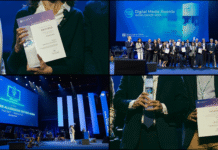“In that dry cave on Telegraph Hill, where you see me often go when the tribe is down by the sea, I have stored many books. In them is great wisdom . . . It were just as well that I destroyed those cave-stored books – whether they remain or perish, all their old truths will be discovered, their old lies lived and handed down. What is the profit.”
– Jack London, The Scarlet Plague, 1915
The Frankfurt Book Fair went ahead on its traditional fairgrounds, albeit as a gathering limited to select categories of participants and accompanied by a political controversy that forced fair director Jürgen Boos to a public justification. As a ‘hybrid’ event, its organizers could not have been more clear with their slogan this year: ‘Re:connect.’ But in a ‘hybrid’ rights trading environment, it is difficult to discern the relevant proportions between the physical event and its overlapping digital components, or to draw any conclusion on the actual success of the one as compared to the other. This time, however, only 126 publishers registered as online exhibitors, and 72 of these had virtual booths.
For the physical part, the number of exhibitors reached 1,900, i.e., about a quarter of the 2019 achievement. Visitors had to book their tickets online, and their number was restricted to 25,000 per day, i.e., one-third of the usual affluence, with preference given to trade visitors. The accreditation of journalists was also limited to the fair’s main media contacts.
Consequently, most of the professional rights trading happened online, a trend that is likely to continue. Already before the Covid-19 pandemic, more and more rights acquiring activities have been detached from book fair gatherings. Around one hundred tables were used at the Literary Agents and Scouts Centre this year, as compared to the roughly 500 in previous years, whereas Frankfurt’s online rights catalog has swollen to some 400,000 titles.
Despite these restrictions, the Indian book industry had a presence of 21 booths in Frankfurt, including 9 publishers and dealers, 3 printers, and 9 software companies. In addition, 25 Indian publishers were represented at NBT’s collective stand. A total of 40 collective stands constituted one of the solutions for those who couldn’t make it to Frankfurt.
Collective booths also included the USA with 60 publishers, the UK with 52, Australia with 30, and several Asian, European, and Latin American countries next to Iran, Egypt, Syria, and Russia. Canada’s book industry, this year’s guest of honor, was represented by 165 French- and English-language publishers divided over two collective booths under the motto ‘Singular Plurality’ with 68 of these physically present. The Canadian pavilion at FBF’s Forum space transported visitors into a stream of waves and mountain silhouettes made of typographically underlined flows supposed to open up new horizons.
Two collective and several individual booths represented 110 Chinese publishers and printers, of whom around 50 were actually present. South Korean publishers, printers, and prepress companies, 23 in total, had a collective stand and several individual ones. The Philippines brought 16 publishers and prepress companies to Frankfurt, Japan 12 publishers. Indonesia, Singapore, Taiwan, Myanmar, Nepal, and Bangladesh also had small collective delegations at the fair. New Zealand’s book industry had to be limited to a small online presence.
In the week before the fair, conferences on academic and trade publishing were held online, flanked by a series of networking sessions and masterclasses on audio publishing, censorship, digital access, and innovative business models. At the fair itself, some of the highlights discussed and presented included indigenous, migrant, and feminist literature and the impact of the ongoing pandemic on the book industry. Several authors debated LGBTQ+ rights and the Black Lives Matter movement in the USA.
Right at the beginning of the fair, the presence of publishing house Jungeuropa, linked to Germany’s political far-right, sparked a controversy that picked up momentum after an enigmatic press release by the FBF organizers on unnamed authors canceling their presence at the fair. Afrogerman author Jasmina Kuhnke, who was to present her book Black Heart, had refused to attend because she felt threatened by the presence of far-right racists. Several authors followed suit, the Anne Frank educational institute expressed its solidarity, and the city of Frankfurt’s left parliamentary group commented, “The Frankfurt Book Fair must not offer these publishers a stage,” referring to the fact that the presence of the new right-wing publishers has already led to protests and demonstrations at the fair since 2017. Criticized for allowing far-right politically based publishing interests to the fair, FBF director Boos at a press conference stated, “The world of books cannot in good faith shut out viewpoints that aren’t welcome to the majority; that plurality of the art and the vocation is either there or it’s not.”
The next Frankfurt Book Fair is to take place from 19 to 23 October 2022.


















